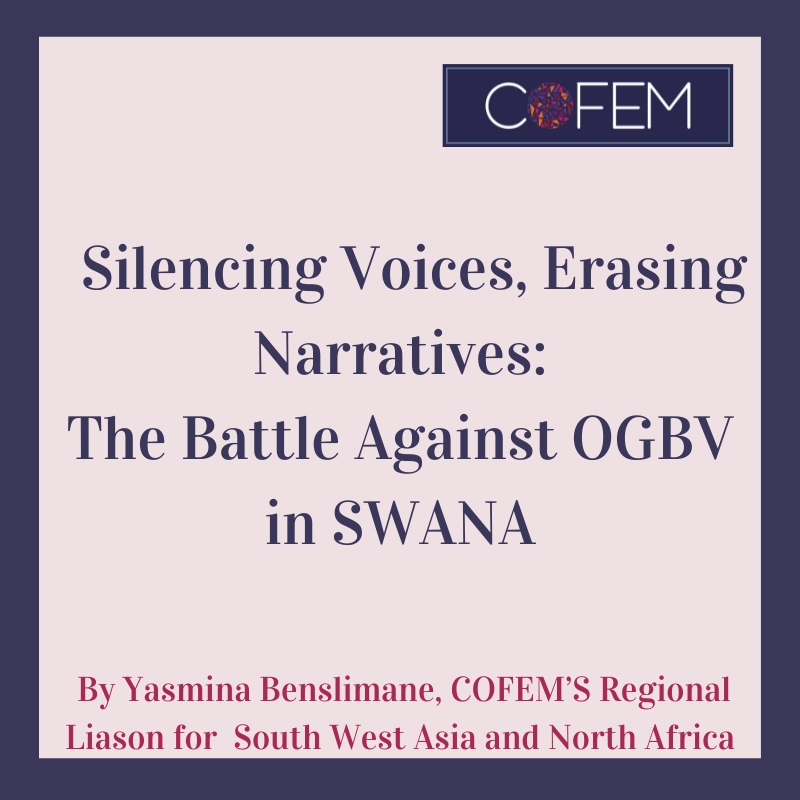In the South West Asia and North Africa (SWANA) region, the struggle for gender equality extends beyond the streets and into the digital realm, where patriarchal norms and toxic masculinity continue to exert control over women’s voices. The alarming rise of Online Gender-Based Violence (OGBV) is both a reflection of offline oppression and a manifestation of deeply ingrained societal attitudes that seek to silence those who dare to challenge the status quo.
Feminist activists in the SWANA region face a twofold battle: combating GBV and intimidation from authoritarian regimes while also confronting repression that pervades digital spaces. The entitlement displayed by government and male-identified figures in a hetero-normative society perpetuates OGBV, rooted in patriarchal ideologies. It fuels a culture of silencing against those brave enough to speak out against injustice. Tech companies contribute to this culture by censoring and de-platforming countless activists. This digital apartheid, reminiscent of the offline world, creates a hostile environment where feminist activists are subjected to shadowbanning, online harassment, and systematic attempts to suppress their voices. The truth becomes a target for repression, as any deviation from mainstream narratives or defiance of patriarchal norms is met with retaliation.
Women human rights defenders (WHRDs) in the SWANA region are on the front lines of this battle. Their tireless efforts for justice and human rights are met with intimidation, physical violence, and even sexual assault. The targeting of WHRDs, as documented by organizations like Femena, reveals a grim reality where advocating for basic rights comes at a great personal cost. A recent case of death threats against Moroccan feminist activists in the wake of the upcoming new family code Moudwana, underscores the systemic nature of this violence. Whether it’s the digital violence against women in Lebanon, the continuous disruption and shutdown of internet services in Sudan posing a significant threat to the work and safety of WHRDs and Women’s Rights Groups in Sudan or the surge in online abuse faced by politically active Afghan women post-Taliban take over, the pattern is clear: women in the SWANA region are disproportionately targeted.
The silencing of Palestinian narratives, whether online or offline, perpetuates an apartheid-like system where voices of dissent are systematically erased and marginalized. The strategic use of atrocity propaganda by Israel, particularly on social media, serves as a tool in justifying the relentless targeting of Palestinians. Gendered disinformation perpetuates violence as noted by feminist organizations across the SWANA region, denouncing the exploitation of sexual violence as a weapon of war in the propaganda campaign for genocide. This disinformation campaign distorts the reality of the Palestinian struggle and contributes to broader trends of digital manipulation and normalization of violence.
Tech companies, like Meta, are complicit in perpetuating this culture of digital violence and must be held accountable for their role in enabling and facilitating it. Their failure to address OGBV perpetuates a cycle of repression that conceals free expression and undermines the fight for gender equality. In the digital age, the fight for gender equality cannot afford to ignore the battleground of OGBV. Activists, academics, practitioners, civil society organizations, and tech giants must unite against OGBV, paving the way for a future where all voices and bodies are respected. Only through collective action can we dismantle the structures of oppression and build a more just and equitable feminist digital space.
The fight against OGBV in the SWANA region requires a holistic approach that addresses both physical and digital forms of repression. Solidarity across borders is crucial, it demands not just acknowledgement but tangible steps toward change, including knowledge-sharing networks, internet governance and policy reforms, and robust support systems for survivors. By confronting patriarchal norms and challenging systemic injustices, we can work towards a future where all voices are heard and all bodies are respected, online and offline.
To learn more about OGBV in the SWANA region, please visit this link.
